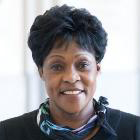Betty Bigombe | Uganda

Betty Oyella-Bigombe, Uganda
Betty began her career with the Ugandan government as a member of Parliament in 1986, during a period marked by rebel fighting that ravaged the country’s northern districts. The Lord’s Resistance Army (LRA), under its leader Joseph Kony, used violent guerilla tactics and child abductions, to kill thousands of civilians.
In 1988, Betty was appointed as the Minister of State for Pacification in Northern Uganda. In this position, she worked to establish stability and reconciliation in the region, becoming one of her country’s most important peacemakers. One of the greatest challenges to the peace process was convincing Kony and his men to engage with the government representatives. Betty initiated contact with Kony in June, 1993, when she traveled with a small team into the bush to urge him to stop the violence and participate in talks with the government.
This initial contact set the stage for face-to-face negotiations between LRA leaders and Ugandan government officials. These negotiations, dubbed the “Bigombe talks,” generated global interest, and members of the international community observed the negotiation. Betty promoted change from all sides: locally, as well as by trying to move the government’s approach to pacification. Betty succeeded in ratifying an amnesty law, and in so doing, brought ten thousand rebels from the bush to participate in the negotiations.
Betty’s attempts to pacify LRA violence were controversial. She was frequently the object of harassment and death threats. Compounding the obvious danger of her work was the fact that she is a woman, operating in a high-profile role traditionally reserved for men. Yet Betty persevered, dedicating many of her own financial and personal resources to the peace process. Her firm commitment to the negotiations won her the honor of being named Uganda’s Woman of the Year in 1994.
When the negotiation talks fell apart in February of 1994, and rebel violence intensified, it came at a great personal cost. Betty remained involved in the struggle for peace, but also took advantage of opportunities to educate the international public about the conflict and her experiences. In 1997, Betty accepted a fellowship award in International Development at Harvard University. After completing her program with Harvard, she worked at the African Development Bank and the World Bank. However, in 2004, in the wake of the brutal Barlonyo massacre near Lira town in northern Uganda, Betty felt compelled to return to Uganda. She left the World Bank and returned to her homeland to serve as the chief mediator on a second wave of LRA peace negotiations. Although these peace talks ended in 2005, Betty’s work has created a firm foundation for the Juba talks, which are currently taking place on the border of Uganda and Sudan. Betty has served as a Distinguished Fellow at the United States Institute of Peace and the Woodrow Wilson Center. She worked behind the scenes in Uganda to further the peace process and from 2011-2014, Betty served as the State Minister for Water Resources in Uganda’s Cabinet. She now utilizes her peacebuilding skills in her new position as the Senior Director for Fragility, Conflict, and Violence at the World Bank.